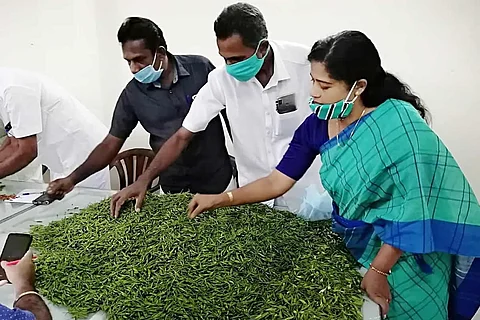

Could anyone have imagined that the humble Kanthari Mulaku (Bird’s eye chilli), which often grows neglected in our backyards, would support an economy on its shoulders? It happened at a village in Kerala’s Kottayam where the farmers joined hands to beat the lockdown woes.
Farmers in the Kanamala village bordering the Erumeli forest division faced serious threat from wild animals, which raided the crops in their farm lands every day. They then shifted to rubber farming and were earning a profitable margin. But when rubber prices dipped, the farmers lost hope.
It was in February that the Kanamala Service Co-operative Bank called a meeting of the farmers with the bank’s President, Adv Binoy Mankanthanam, who announced that the bank was ready to procure the chilli from the farmers at a fixed price of Rs 250 per kg. The bank also said it will encourage Kanthari Mulaku cultivation and provide interest-free loans for farmers to begin the farming. Currently there are 18 farmers’ clubs formed under the bank and nearly 500 farmers are engaged in Kanthari farming.

The bird’s eye chili is a small but extremely hot chilli that is used extensively in many Asian cuisines.
Speaking to TNM, Adv Binoy says, “Erumeli panchayat consists of 10 wards and 98% of the area is under threat of attacks from wild animals. Due to this, farming is not practical in Kanamala village. As part of a discussion, we found that Kanthari Mulaku farming was more practical in the village because wild animals do not raid Kanthari crops. So we decided to procure the chillies from the farmers at a fixed price of Rs 250 per kg. If we get more profit from the chilli, we will increase the fixed price.”
Binoy continues, “Before we spoke to the Kanamala farmers about procuring Kanthari from them, I visited the Thrissur market and some chilli farmers in Palakkad district to know the details of Kanthari farming and its sale. The vendors at the Thrissur market assured me that they were ready to procure any quantity of Kanthari Mulaku.”
“When the bank assured a market and fixed the price, hundreds of the farmers, including several women, started Kanthari Mulaku cultivation in their farm lands. Another interesting aspect is that many students have planted the chilli in their backyards to earn some pocket money. The Kanthari can be planted amongst rubber plantations and in the backyards of homes too. The bank has 10,000 shareholders and we’re ready to procure the chilli for them,” says the bank president.

“Fifteen days ago, we conducted the first procurement and collected 103 kg of Kanthari while the next procurement touched 123 kg. We hope in the coming days the collection will touch over 500 to 1,000 kg. After we started the initiative, many companies, including Ayurvedic firms, came forward to procure the Kanthari Mulaku in any quantity,” Binoy adds.
Joby Nellolapika, a farmer in Kanamala, tells TNM, “After the bank announced the fixed price, I also started Kanthari Mulaku farming. I planted the chilli in over 20 cents of land as an intercrop. Kanthari normally grows in our backyards and plantations but there was no proper market for the product. With the bank now offering fixed price and a market, the farmers in the region have decided to engage in Kanthari farming. Now we have realised that this small chilli provides us a large income during this lockdown,” the farmer says.
Babu Abraham lnchiyil, a farmer in Kanamala, says that the decision by the Kanamala Bank has come as a big relief to small-scale cultivators like him. “Nowadays we get only Rs 120 per kg for rubber. But for Kanthari Mulaku, we’ll get Rs 250 per kg. We can plant the chilli as an intercrop in our rubber plantations. In the last procurement, I sold five kg of Kanthari and earned Rs 1,250. My friend Appu and I have now decided to plant Kanthari in a larger area,” he says.

The Kanamala Bank has also announced three other programmes to boost the local economy – Pampavalley Pothu Gramam (Beef village), Eruthuvappuzha Then Gramam (Honey village) and Mukkootuthara Meen Gramam (Fish village).
“The bank will provide low interest loans for building fish tanks, buying buffalo calves, and setting up honey bee units. We have announced a fixed price of Rs 300 for one kg of beef, Rs 300 for one kg of fish and Rs 200 for one kg of honey. If the farmers don’t get a market for these items, the bank will procure the goods at fixed rates,” Binoy explains.
“When farmers get assurance of a fixed price and market, they will be ready to cultivate any crop. The bank aims to provide a helping hand to the farmers during the lockdown period. The bank is also planning to start an online Facebook market to sell farm products from the region,” he adds.